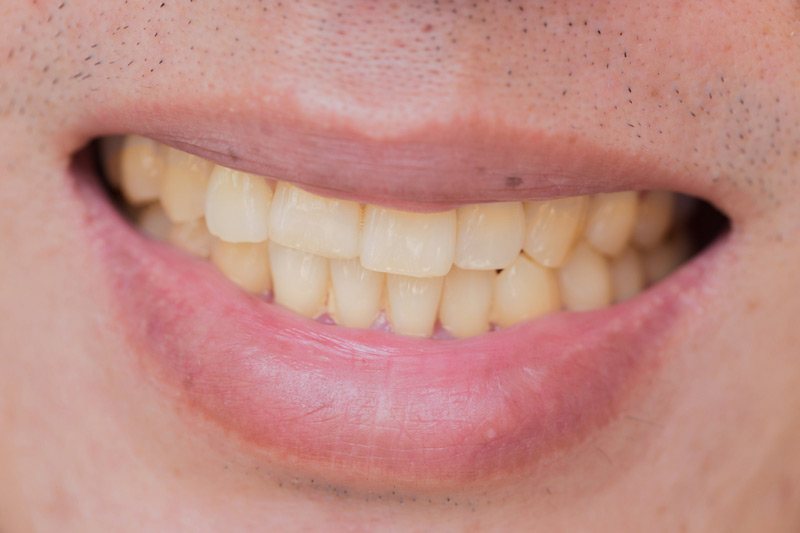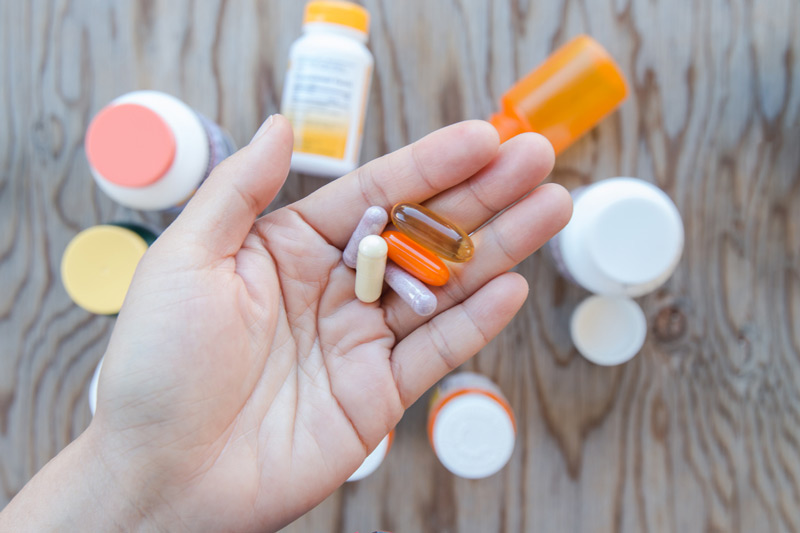8 Major Causes of Yellow Stains on Teeth
 Have you ever caught a glimpse of yourself in the mirror while brushing your teeth and then wondered how on earth your teeth seem to have suddenly become yellow in color? If this is you, then don’t panic. It happens to most people at some point during their lives, and because yellowing is a gradual process, you won’t notice a difference overnight, which is why yellow teeth seem to get overlooked.
Have you ever caught a glimpse of yourself in the mirror while brushing your teeth and then wondered how on earth your teeth seem to have suddenly become yellow in color? If this is you, then don’t panic. It happens to most people at some point during their lives, and because yellowing is a gradual process, you won’t notice a difference overnight, which is why yellow teeth seem to get overlooked.
Fortunately, if your teeth have taken on a yellow tinge this just means you may need to adjust a few of your daily habits. Yellow teeth are rarely a result of a serious medical condition and while you might feel disheartened that you no longer have a set of sparkling white teeth to show off, you can easily get your pearly white smile back. It all starts with determining the potential cause of your tooth discoloration and making the necessary changes to avoid, or at least limit, your exposure to the potential culprit. Here are seven major causes of yellow stains on teeth, so you know what to look out for and avoid.
Tooth Enamel
Teeth are composed of both dormant and living particles. The part of your tooth that is dormant is a key component of healthy teeth: enamel. The inner parts of your teeth are known as dentin. So, while there are many factors within our control that we can adjust to improve the whiteness of our teeth, if you don’t have a certain thickness of enamel, then the naturally darker color of your dentin is going to be much more noticeable. There is currently no proven way to thicken your tooth enamel, but you can stop it from thinning by using the correct products that are recommended by your dentist or dental hygienist.
The Aging Process
If you look at small children, their teeth almost always appear whiter than those of an adult. The reason for this is because, as we age, our teeth become discolored due to thinning enamel. The dentin underneath the tooth’s natural enamel also yellows as part of the natural aging process and can also cause us to have sensitive teeth. This is just another reason why, throughout our lifespan, we need to commit to a daily oral hygiene routine that will help our teeth to remain strong for a longer period of time. Bacteria often causes tooth enamel to dissolve, so always endeavor to maintain a fresh and clean mouth.
The Foods You Eat

- Red wine
- Tea and coffee
- Colored fruits and spices such as blueberries and saffron
- Ketchup
- Fizzy drinks
You don’t need to cut the above-mentioned items out of your diet entirely, but moderation is key to your dental health. Always be sure to brush and floss regularly to reduce the negative impact that certain foods have on your teeth. You also want to be looking at visiting your dental hygienist regularly for a thorough professional cleaning to eliminate plaque and tartar.
Tobacco
We mentioned earlier in this article, that the number one cause of tooth discoloration is due to lifestyle choices. While we all have our vices, cigarettes,and chewing tobacco is a major enemy when it comes to maintaining healthy, white teeth. The nicotine found in cigarettes is a huge culprit of staining teeth yellow or brown. We like to see the positive in everything—so while your teeth might have been temporarily affected by smoking, you now have an excellent excuse to ditch the cigs permanently!
Poor Dental Hygiene
If you are guilty of not brushing and flossing regularly, then you are neglecting your teeth and leaving them wide open to turn yellow. By not maintaining good oral hygiene, you will allow stains and bacteria to build up resulting in yellower teeth as well as other potentially more serious dental issues. Daily life and its hassles can get the better of us too easily, so it’s understandable that your teeth have been put on the back burner. Fortunately, improving your dental routine is something that you can put into effect at any time. Be sure to use a recommended toothpaste containing fluoride to brush regularly and swish water around your mouth after eating and drinking to keep your teeth clean and white. You should also schedule a professional cleaning at least twice per year for optimal dental health.
Pharmaceutical Medications

Medical Conditions
Your teeth can be negatively affected by a range of medical conditions and treatments such as:
- Xerostomia
- Acid Reflux
- Gastrointestinal issues
- Neonatal jaundice
- Sickle Cell Disease
In addition to these conditions, chemotherapy and radiation therapy can also cause your teeth to brown as the treatment inhibits the production of saliva (which is responsible for killing bacteria.) If you are receiving pharmaceutical treatment for an illness, be sure to make your dentist aware of this.
Tooth Grinding
Tooth grinding is incredibly frustrating, as it can weaken and discolor your teeth, yet it’s something that happens entirely subconsciously. If you are one of the thousands of Americans who struggle with grinding your teeth during the night, then be sure to speak to your dentist about having a mouth guard fitted to protect your teeth. Any kind of trauma can impact the structure and color of your teeth, so be sure to see a professional right away if you suffer an injury to your mouth.
Final Thoughts
If you want to have a stunning smile, then you are going to have to healthy teeth too. And while you can buy whitening treatments, or even try some DIY methods at home such as baking soda or whitening toothpaste, regular dental checkups and good dental hygiene are the best way to stop yellowing teeth. Always remember that it is super important to rinse your mouth after eating to ensure that no bacteria can build up in or around your teeth. If you want to go ahead and have some teeth whitening treatments, then be sure to consult a professional about the most appropriate method to use. Enjoy whiter teeth today!
Relate Posts to Read:
Dental Hygienist vs. Dentist: What’s the Difference?
